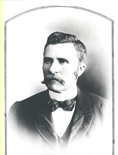 |
Member for Bendigo (Victoria) 1901-1913 |
|
Born near St Ives, Cornwall, England, John Quick migrated to Victoria with his family in 1854 and settled on the Bendigo goldfield. Obliged to work to help his family from the age of ten, Quick was a manual labourer before becoming a reporter for Bendigo newspapers. He was later on the parliamentary staff of the Melbourne Age. Quick graduated from Melbourne University in 1877 and the following year was admitted to the Bar. He was elected to the Victorian Legislative Assembly as the member for Sandhurst in 1880 and two years later was awarded his doctorate in law.
Quick played an important role in the federation of the Australian colonies. He attended federation conventions at Corowa and Bathurst, and it was his proposal that set the framework for the election of delegates to the Australasian Federal Convention of 1897-98, the consideration of a Constitution Bill, and the submission of the Bill to referendum. Elected to the 1897-98 Convention, he was a prominent and vocal member of the Constitutional Committee. Quick was knighted for his outstanding contribution to federation on 1 January 1901.
In 1901 Quick was elected unopposed to the House of Representatives for the federal seat of Bendigo. Although clearly a Protectionist, Quick maintained his independence in the Parliament, putting national interests before party interests. He chaired the Royal Commission on the Commonwealth Tariff 1905-07, and was Postmaster-General in the Deakin ministry of 1909-10. Quick was defeated in the election of 1913.
In 1901 Quick, together with Robert Garran, had published the authoritative Annotated Constitution of the Australian Commonwealth. Following his retirement from Federal Parliament, Quick returned to his legal practice in Bendigo, and wrote a number of influential works on Australian law. Between 1922 and 1930 he was Deputy President of the Commonwealth Court of Conciliation and Arbitration.
previous | list of members | next
|


